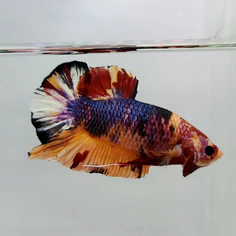Your betta fish isn’t swimming around. You feel frightened. Is it dead? Most likely not. However, it can be cause for alarm. There are several more typical, healthy explanations for your fish’s immobility. Continue reading to find out more about betta fish sleeping, ill betta fish, swim bladder illness, and other topics.
Betta Fish Sleep, Right?
Yes, betta fish do sleep. Your betta is most likely asleep if it is quite motionless, but you can still see its lips and gills moving. Live betta fish for sale is the best option for cheap fish.
Bettas don’t have eyelids; therefore, while they sleep, their eyes are open. Betta fish prefer to sleep at night but will also take daytime naps. Although their bodies require it, they like sleeping and do so gently. At the least sound or vibration, they will rapidly awaken and be prepared to protect their area.
Unwell Betta Fish
Your betta fish can be unwell if it isn’t moving. It could be ill with parasites, bacteria, fungi, ammonia, or nitrate poisoning, or it might have Swim Bladder Disease. If your fish doesn’t get well right away, keep a careful eye on it and call your veterinarian. Lack of appetite and laying at the bottom of the tank are signs of ammonia toxicity.
Ammonia is probably the cause of difficult respiration in your fish. The signs of nitrate poisoning are comparable. Your fish can be on its side and appear pale. Your tank may be cleaned to solve these issues. Perform a 25 to 50 percent water change. It could be time to think about installing a filter if your tank doesn’t already have one.
Unlike humans, bettas’ eyes are located on the sides of their head, which is known as monocular vision. While humans can only see straight in front of them, bettas have the ability to look in two separate directions at the same time! Unfortunately, this causes them to lack depth perception. In our eyes, the shape and curve of our eye lens is changing to achieve the right focus.
However, in bettas’ eyes, the eye lens remains the same. Bettas find it difficult to adjust to brightness changes because of how slow their iris works, and as a result, they have relatively poor vision. To help this handicap, they have a “lateral line” which measures water pressure using its small holes which are connected to specialized nerve endings. This helps the betta to avoid obstacles in its way. The brain deduces those nerve signals as a picture of its environment so the betta can find food. This helps them compensate for their weaker eyesight.
Bladder Disease In Betta Fish
SBD symptoms include strange swimming and buoyancy problems. Your betta fish could swim erratically, on its side, or even backward. Your fish can appear swollen or have a spine curvature. SBD is most frequently brought on by overfeeding, although other factors like as bad water quality, parasites, injuries, and diseases can also be to blame.
Fortunately, SBD may be cured if discovered and treated promptly. Read more about betta fish maintenance. Live betta fish for sale is the best option for cheap fish.
Examine whether there are any adjacent fish, alterations to the tank’s surroundings, or other potential stresses. It could be necessary to downgrade if your filter generates a significant current. Almost all varieties of betta fish dislike high currents.
Think about expanding your tank. Despite what you might see in pet stores, betta fish don’t like to live in little containers. Allow your betta fish a tank with at least 2 gallons of room. A tank heater is great for betta fish since their preferred water temperature is between 75- and 80 degrees Fahrenheit (or 24 and 27 degrees Celsius). I used to find my bettas were slower in the cold when I didn’t use a heater.
It is not believed that any of my bettas have ever died from it, but I wasn’t giving them the best habitat. Betta fish have aging-related slowing, much like all other living things. They won’t behave as energetically as they formerly did.
The Bottom Line
Bettas are tropical freshwater fish that go to sleep in the evening, according to Betta Fish Facts. A stationary betta can just be relaxing or sleeping. While each fish has a different favored sleeping position, some bettas will just lie on their sides.



































































